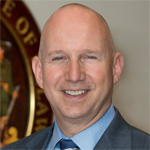
Facebook Twitter Google+ Instagram Pinterest Flickr YouTube
Written on: October 27th, 2015 in Job Creation
Let’s celebrate the immeasurable contributions of people with disabilities to our workforce.
October is the nation’s 70th National Disability Employment Awareness Month, a time for us to celebrate the immeasurable contributions of people with disabilities to our workforce – in technology firms, classrooms, restaurants and all kinds of workplaces. NDEAM was first launched in in the immediate aftermath of World War II (then it was called “National Employ the Physically Handicapped Week”) as part of an effort to integrate returning soldiers into the economy. As a poster from the era put it, “America needs ALL of us.”
That’s as true in 2015 as in 1945, and this year we need a renewed sense of urgency on this issue. Though America badly needs them in the workforce and the economic mainstream, there are nearly 600,000 working age individuals with disabilities actively searching for jobs. Seventy years after that initial appeal by President Truman and Congress, it is unacceptable both morally and pragmatically that so many people with disabilities who have something to offer are relegated to the economic margins, eager and able to work but unable to find work.
Fortunately, experience tells us that change is possible. States and businesses are proving that employing people with disabilities is not an act of charity or sympathy; it’s enlightened self-interest at its very best. It enriches and diversifies our workforce. It’s good for business and good for taxpayers.
For instance, IT firms like SAP and Delaware-based CAI have committed to hiring people with autism — some of whom have a great attention to detail and ability to recognize patterns, making them a great fit in fields like software testing. Microsoft has launched a similar pilot on its Redwood, Washington, campus.
Meanwhile, the majority of state governments are embracing a national movement called “Employment First” through which they are realigning public investments to make competitive, integrated employment the first choice for people with disabilities. For example, South Dakota is making its Department of Human Services a single point of contact to educate employers, provide technical assistance, and connect employers with qualified individuals. The Department has also reviewed the accessibility of its programs and services and is striving to make the state a model employer of people with disabilities.
We need more states to get on board – to support businesses in their efforts to employ people with disabilities; to become model employers themselves by increasing the number of state employees with disabilities; to prepare youth for an expectation of a lifetime of work rather than public support; and to maximize limited resources to advance employment opportunities.
The U.S. Department of Labor, through its Disability Employment Initiative and Employment First State Leadership Mentoring Program, is committed to helping states move the needle further. And the newly implemented Workforce Innovation and Opportunity Act provides even greater opportunity for state governments to bust silos in a way that harmonizes workforce investment, vocational rehabilitation and other systems to support Employment First.
When people with disabilities get those jobs, the results speak for themselves.
Governor Markell met a young man with Down syndrome at a Delaware bank, where he had a new job making promotional t-shirts. He told the Governor how grateful he was for the opportunity to earn a paycheck and be a part of the team – and how much better it was than sitting at home watching TV.
Brett Reilly is taking on various IT projects as a recent hire at Delaware’s Department of Health and Social Services. Brett’s mother talks about the happiness that having a job has brought to her son, a whiz at math and science, who just “needed something to boost his confidence.”
Kendra Gottsleben worked on South Dakota’s recent “Ability for Hire” campaign along with Governor Daugaard. She refuses to be defined by mucopolysaccharidoses type VI or slowed down by a wheelchair, choosing instead to be known as an author, advocate, model and social media coordinator for the University of South Dakota Center for Disabilities. While she cannot change her condition, Kendra said she can change how she lives with it and is grateful for the chance to go to work and attend meetings “like everyone else,” even if she has to “work a little harder to get there.”
This year’s NDEAM theme is: “Disability Is One Part of Who I Am.” The reality is that your disability is not the extent of your identity. People with disabilities have many interests and skills; they are an untapped source of ingenuity and productivity. As long as we’re leaving so many people with disabilities on the sidelines, we are not only denying them opportunity; we are undermining the competitiveness of our businesses and stifling economic growth. Working together, we can successfully take up this unfinished business, ensuring that America captures the talents of all our people.
Jack Markell is the Governor of Delaware, Dennis Daugaard is the Governor of South Dakota and Tom Perez is the U.S. Secretary of Labor.